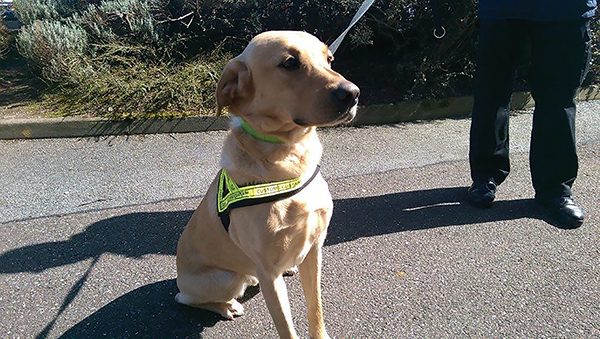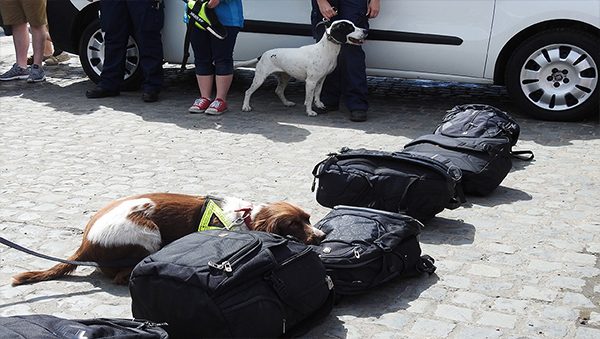
Marley sit’s to Attention. Pictures courtesy of the Revenue commissioners
On the front line safeguarding this nation’s fiscal, social and economic welfare at Dublin Port is a team of canines and handlers who work as a team hired to detect the illicit importation of drugs, cash and tobacco.
The detector-dog team in the face of the ‘shadow economy’ is Alfie, Bill, Casey, Defor, Elvis, Frankie, Grace, Harvey, Hollie, Josie, Lottie, Marley, Meg, Ollie, Ralph, Scooby and Stella who are made up of Springer, Springer Cross, Labradors and Labrador cross breeds. This team are based at different locations around the country, including ports, airports and mail centres.
Detection dogs begin their working life at around eighteen months and their careers normally last between six to eight years. Depending on its breed, its scenting ability can range from a thousand to ten-thousand times greater than that of a human. These canines may be single, dual or multi scented and so therefore can detect cash, drugs or tobacco or all three.
A spokesperson for the Revenue Commission told NewsFour about how they are trained to detect: “All Revenue dogs are trained to be multi-purpose. That is, they are trained to screen both people and freight. Our dogs are trained to have a ‘passive response’ meaning that they will ‘sit and stare’ when they find contraband. Each dog is different, and each job is different, so a working day in the life of a detector dog and handler will always be varied and challenging. For example, each dog’s capacity for continuous searching varies. The minimum intensity at which they will detect a scent can also vary, and can be affected by climate and internal or external environment. The handler knows his or her dog well, is sensitive to the effect of the particular job and the working conditions on the dog, and makes the decision on how to deal with each task that comes their way.

Meg on the scent from Riverfest
“The dogs must be allowed to acclimatise as they move to different environments in the course of a day, and the handler is responsible for ensuring the wellbeing of the dog in all circumstances, including, of course, ensuring that the dog is rewarded for positive results, usually with some play time with a tennis ball, their favourite, after a challenging task.”
Unfortunately, NewsFour are unable to find out the performance statistics for each canine at Dublin Port. This is a security and protection measure as successful dogs have become targets from criminals involved in the drug trade and the Revenue Commission do not want individual dogs identified.
According to a source who wants to remain anonymous, a dog who went by the name of ‘Donny’ was so good at his job of detection and hindering illicit drugs trade, that the criminals who were out of pocket due to his snooping put a ‘hit’ out on the dogs head. The dog is now happily retired running after tennis balls thrown by his handler and probably unbeknownst to how close he came to the dark underworld.
The unit operates on a relatively frugal budget. Figures retrieved from the Revenue Commissioners show an expenditure of €430k in a four year period between 2013 and 2016 for the detector dog programme which provided for training, food and boarding, vet fees and ancillary equipment required to allow the department to run efficiently. In that period, Revenue detector teams were involved in operations leading to seizures of smuggled tobacco products, drugs and cash to a combined value of over €79m.
Although it is also to be noted that assisting this canine unit are the mobile x-ray scanners and Ireland recently acquired its third scanner in June of this year at a cost of €1.668m, which was part funded by OLAF, the European anti-fraud agency.
by Paul Carton



